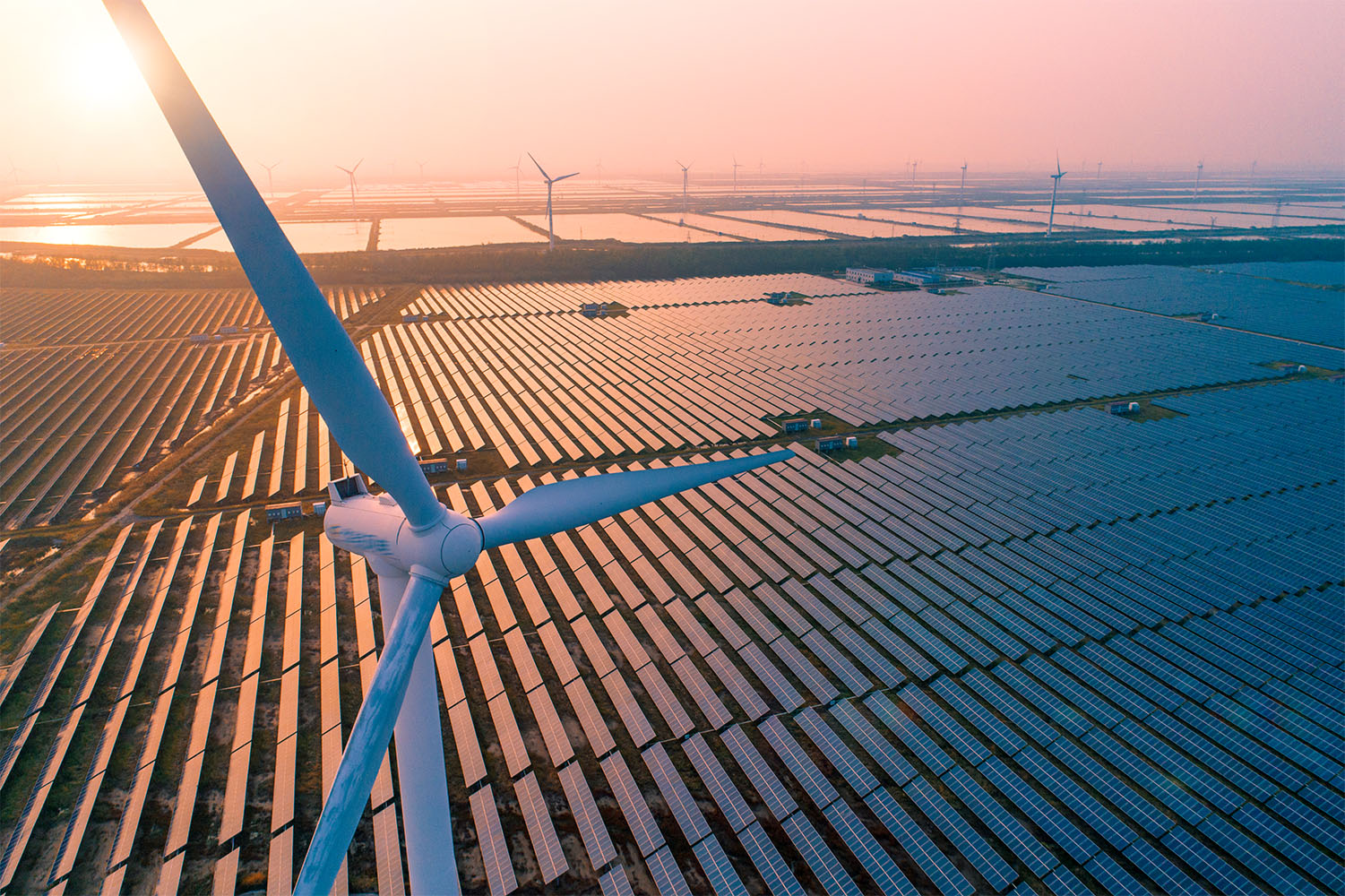Looking back on COP26 and ahead towards COP27: what to expect
Published on 7th November 2022
With COP27 taking place one year after the previous climate conference, our panel of experts discussed the background and predictions for it in a recent webinar

In anticipation of the COP27 climate conference, taking place in Egypt between 6 and 18 November, questions about what has been achieved since last year's COP26 in Glasgow became increasingly prominent. Predictions about what may or may not be achieved at the upcoming conference in Sharm El-Sheikh were a topic of widespread debate.
In the first webinar of our "Decarbonisation Week" series, James Murray (Editor-in-Chief of Business Green) hosted a discussion on the lasting importance of COP26, what has happened over the past year, and expectations leading up to the next conference. The panel of experts also included Keith Bottomley (Deputy Policy Chair, City of London), Jeremy Matheiu (ITV Head of Sustainability), and James Watson, Carlos Gioffre and Dipika Keen from Osborne Clarke's Decarbonisation team.
Why was COP26 important?
The panel agreed that the feeling of collective responsibility and action which resulted from different countries uniting with the mutual purpose of tackling climate change and honouring the commitments in the Paris Agreement (adopted at COP21 in 2015) was a highlight of the conference. This led to a real sense of impetus behind the transition to net zero among both businesses and governments.
From a UK perspective, the messaging from the government on the significance of COP26 was unambiguous, and the importance of the summit as being at the forefront of the political and corporate agenda was evident. As the host nation, the UK demonstrated leadership in driving collaboration and agreement among the nations in making climate commitments.
The crucial question of the funding that is needed to meet the commitments in the Paris Agreement was a primary focus of COP26. A significant development was the launch of GFANZ (the Glasgow Financial Alliance for Net Zero) – a global coalition of leading financial institutions committed to accelerating the decarbonisation of the global economy. While the panel acknowledged that there have been controversies concerning greenwashing and a small number of signatories dropping out of the alliance since its launch, it remains a hugely significant body, with over 500 financial firms and $130 trillion of capital finance involved. Mr Bottomley commented that the central drivers behind the changes needed to meet the Paris Agreement commitments are policy and finance, and that GFANZ demonstrates that the finance needed to drive real change is available.
The pledge, as part of the Glasgow Climate Pact, that countries would revisit and strengthen their emissions targets (set out in their Nationally Determined Contributions (NDCs)) in 2022 was another significant feature arising out of COP26. However, only 24 countries have submitted revised NDCs to date.
Geo-political climate since COP26
The invasion of Ukraine by Russia and the ongoing energy crisis has meant that, to some extent, climate ambitions have been blown off course and fallen down the list of immediate priorities for many countries.
The current economic climate also means that this sentiment applies equally to corporates who may focus their attention on staying afloat in the coming months and years.
Not all developments have been negative – the panel discussed crucial indicators of progress towards climate ambitions including the historic climate legislation passed by US president, Joe Biden, and new policy commitments on reducing deforestation made by the newly elected Brazilian president, Lula da Silva, who returns to office after a 12 year interval.
Policy and regulation in Italy
Since COP26 the Italian government has introduced new legislation to support increased renewable energy generation and the transition of the energy system away from fossil fuel generation. These measures have sought to promote investment and ease bureaucracy surrounding renewable generation and have led to a sizable increase in renewable generation capacity in recent years.
The Italian Parliament has also recently approved the inclusion of environmental protection among the fundamental principles of the Italian Constitution.
UK policy developments
At COP26 the UK agreed to phase down the use of coal and fossil fuel in energy generation, and while coal represented only 2% of the energy mix in 2020, the energy crisis has led to the extension of generation licences for some coal plants. In the same vein, a decision has also been made to open up oil and gas exploration licences in the North Sea. The government's commitment to ban fracking has been confirmed by the new prime minister, Rishi Sunak, following a controversial decision by his predecessor, Liz Truss, to overturn the ban.
Progress has been made in certain policy areas, such as increasing carbon reporting obligations and in the transition towards zero tailpipe emissions.
Corporate responsibility
Private investment in green infrastructure and established green technologies such as solar and wind energy generation have been particularly robust in the general investment trends that have followed COP26.
The more negative developing trend of increasing numbers of businesses choosing not to release their carbon reduction plans for fears of greenwashing claims (known as "green hushing") has led to fears of a loss of momentum from the private sector in driving carbon reductions. Governments may need to take a larger role in pushing carbon assessments and reporting up the agenda, given that businesses may be less likely to prioritise these on their own initiative as a result of the impending economic downturn.
Mr Matheiu spoke about the steps that ITV has been taking since a number of broadcasters signed a Climate Content Pledge at COP26 to help audiences understand what tackling climate change might mean for them, as well as inspire and inform sustainable choices. This has resulted in content discussions ranging from the more obvious hard-hitting climate-based documentaries, to a more pervasive approach which has seen sustainability themes incorporated into mainstream television programmes in a bid to normalise these topics and increase audience engagement. These efforts have also been coupled with ITV's journey to reach its own net zero targets, including the ever-tricky calculation and reduction of the "Scope 3" emissions category.
The panel discussed the issue of a business's pursuit of green policies not being expected to come at the expense of sacrificing the bottom line. Profit remains integral to any business, and sustainability strategies and core business strategies need to speak to each other and should not be considered separate issues. There are a wealth of opportunities that net zero can present for forward-looking businesses that are prepared to play their part in the transition. Long-term profitability also requires an understanding of the consumer base, for whom sustainability is an ever-increasing motivator.
Predictions for COP27
The panel discussed the mixed feelings and contrasting background factors leading up to COP27. This year's conference feels much more challenging than COP26, with the late release of the agenda adding towards a feeling of increased difficulty.
Disagreements around climate finance and loss and damage – a key theme of COP27 – have the potential to be tense, with some South American countries having said that they will use their veto to disrupt proceedings if these issues are not resolved satisfactorily. That the UK prime minister was, at one stage, not planning to attend the conference also left room for cynicism about how committed the UK (as the outgoing COP host country) is to honouring the commitments made at COP26 and in the Paris Agreement.
The panel felt that there is, however, plenty of room for optimism. Though the agenda for COP27 was delayed, its content is exciting and touches on key issues of the implementation of climate plans, financing for loss/damage and gender equality issues on the road to decarbonisation.
Osborne Clarke comment
The energy crisis has added increasing urgency to the need to reduce reliance on fossil fuel for energy needs, and a sizeable and urgent shift towards alternative methods of energy generation is needed. The convening power of the COP format in getting people together to tackle the major global issue of climate change was one of the key takeaways from COP26, and its ability to drive progress on key issues should not be underestimated.





